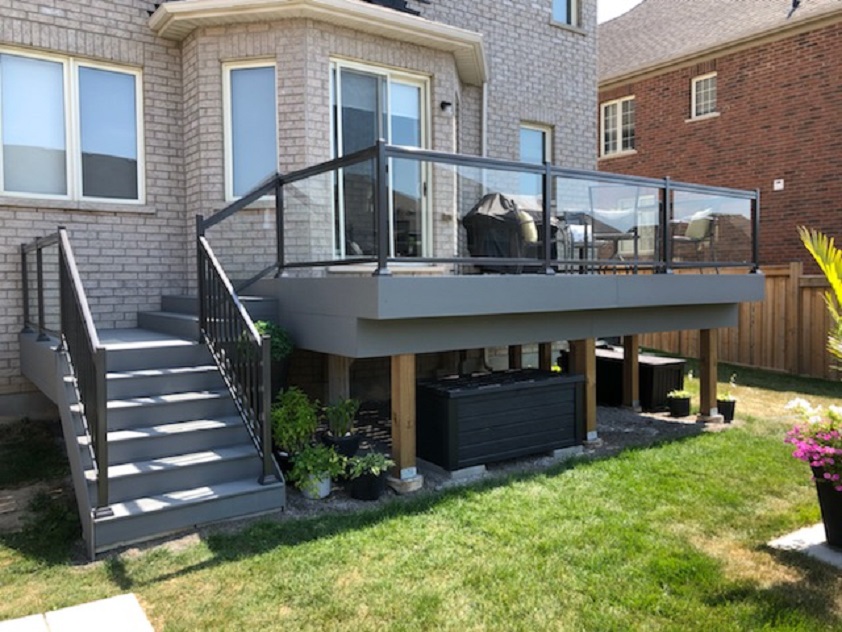In the realm of outdoor living spaces, composite decks have emerged as a popular choice for homeowners seeking durability, aesthetics, and sustainability. Composite decking offers a multitude of advantages over traditional wood decking, making it a compelling option for those looking to enhance their outdoor spaces with minimal maintenance and maximum longevity. In this article, we delve into the world of composite decks, exploring their benefits, considerations, and why they're increasingly becoming the go-to choice for modern outdoor living.
Understanding Composite Decks
Composite decking is a man-made building material composed of a blend of recycled wood fibers, plastics, and binding agents. This combination results in a sturdy and long-lasting material that mimics the appearance of natural wood while offering superior performance and longevity. Unlike traditional wood decking, composite decks are resistant to rot, mold, and insect infestations, making them an ideal choice for outdoor environments exposed to the elements.
Advantages of Composite Decks
- Durability: One of the primary advantages of composite decks is their exceptional durability. Unlike wood decking, which is susceptible to rot, warping, and splintering, composite decking is highly resistant to moisture, fading, and decay. This durability ensures that composite decks maintain their structural integrity and aesthetic appeal over time, even in harsh weather conditions.
- Low Maintenance: Composite decks require minimal maintenance compared to wood decking. Unlike wood, which requires regular staining, sealing, and sanding to maintain its appearance and prevent deterioration, composite decking only requires occasional cleaning with soap and water to remove dirt and debris. This low-maintenance feature makes composite decks an attractive option for homeowners looking to enjoy their outdoor spaces without the hassle of constant upkeep.
- Aesthetics: Composite decking offers a wide range of design options, allowing homeowners to customize their outdoor living spaces to suit their preferences. Whether you prefer the look of natural wood or the sleek appearance of modern composite materials, there's a composite decking option to fit your style. Additionally, composite decks are available in a variety of colors, textures, and finishes, providing endless possibilities for creating a unique and visually appealing outdoor oasis.
- Environmentally Friendly: Many composite decking manufacturers use recycled materials in the production of their products, making composite decks an environmentally friendly choice for eco-conscious homeowners. By utilizing recycled wood fibers and plastics, composite decking helps reduce the demand for virgin materials and minimizes waste in landfills. Additionally, the longevity of composite decks reduces the need for frequent replacement, further reducing environmental impact.
- Safety: Composite decking is designed with safety in mind, featuring slip-resistant surfaces that provide traction even when wet. This is especially important for outdoor spaces such as pool decks and patios, where safety is a primary concern. With composite decking, homeowners can enjoy peace of mind knowing that their outdoor spaces are both beautiful and safe for family and guests.
Considerations for Composite Decking
While composite decking offers numerous benefits, there are some considerations to keep in mind when choosing this material for your outdoor space:
- Cost: Composite decking tends to have a higher upfront cost compared to wood decking. However, the long-term savings in maintenance and replacement costs often outweigh the initial investment, making composite decking a cost-effective choice in the long run.
- Heat Retention: Some composite decking materials may retain more heat than natural wood, especially in direct sunlight. It's essential to choose a composite decking product with heat-reducing technology or opt for lighter-colored decking to minimize heat absorption.
- Installation: Composite decking installation may require specialized tools and techniques compared to wood decking. While composite decking is generally easier to install than wood, it's essential to follow manufacturer guidelines and hire a professional installer if needed to ensure proper installation and optimal performance.
Conclusion
Composite decking offers a host of advantages for homeowners looking to enhance their outdoor living spaces with durability, aesthetics, and sustainability. From its exceptional durability and low maintenance to its wide range of design options and environmental benefits, composite decking is revolutionizing the way we approach outdoor living. Whether you're building a deck, patio, or outdoor entertainment area, composite decking provides the perfect blend of beauty and functionality for years of enjoyment. Consider composite decking for your next outdoor project and experience the difference it can make in your outdoor living experience.





Comments